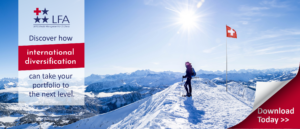As more wealthy Americans consider moving a portion or all of their assets overseas, Switzerland has re-emerged as a preferred destination for its long-standing reputation as a global banking and asset protection hub. Yet for U.S. citizens who want to invest in Switzerland, opening and maintaining a Swiss bank account isn’t as straightforward as it once was.
According to Henley & Partners, there’s been a 1,000% increase in investment migration applications from U.S. citizens since 2019, with Switzerland among the most requested destinations.
The process now involves additional layers of compliance, documentation, and due diligence. However, partnering with a Swiss wealth management firm is worth investigating if you seek stability, reduced currency risk, global diversification, and tax-efficient investment strategies.
In this article, we’ll look at four key facts every U.S. citizen should know before moving assets to Switzerland or opening a Swiss bank account:
- You Can Open A Swiss Bank Account As A U.S. Citizen, But It’s Highly Regulated
- Swiss Banking Supports Global Diversification, But Not Tax Evasion
- Swiss Wealth Management Is Built For Long-Term Stability, But Requires Coordination
- How Currency Exchange Rates Affect Your Investment Returns
1. You Can Open a Swiss Bank Account as a U.S. Citizen, but It’s Highly Regulated
It’s a common myth that Americans can no longer access Swiss bank accounts. While some Swiss banks stopped working with U.S. clients after introducing the Foreign Account Tax Compliance Act (FATCA) in 2010, many still do, especially those specializing in global private banking.
Here’s what has changed and how you can open a Swiss bank account as a U.S. citizen:
- A valid U.S. passport
- FATCA-related forms, such as IRS Form W-9
- Proof of income or source of funds
- Details about your tax residency
- In some cases, a personal visit or relationship with a Swiss wealth manager, such as LFA
Swiss banks serving U.S. citizens must report account details back to the IRS. This level of transparency means Swiss accounts are no longer used for secrecy, but for structure, diversification, and strategic asset location.
Most Swiss banks require that you deposit $500,000, with some requiring a larger deposit amount, reflecting their focus on working with higher-net-worth individuals. With that said, there is increased interest among investors with $500,000 transferring assets to Swiss banks to increase their global exposure and currency diversification.
2. Swiss Banking Supports Global Diversification, But Not Tax Evasion
With the dollar’s purchasing power under pressure from inflation, concerns about $37 trillion of debt, and monetary policy shifts, some Americans are exploring how to invest part of their wealth in stronger, more stable currencies. That’s where the Swiss franc and Switzerland’s conservative financial system come into play.
From a tax planning standpoint, Swiss accounts must be reported under U.S. tax law, but they still allow for thoughtful structuring. With the proper legal and financial coordination, Swiss investments can be incorporated into estate plans, trusts, or retirement strategies that align with investors’ long-term financial goals.
While not a tax shelter, investing with a financial advisor in Switzerland can offer a way to manage timing, currency exposure, and asset location, influencing your overall tax efficiency, results, and financial flexibility.
Swiss banks offer a wide range of options for those interested in investing in Switzerland or global asset allocation from a neutral, highly regulated country. This can include:
- Multi-currency accounts
- Professionally managed investment portfolios
- Custody of international securities
- Wealth transfer tools such as trusts and foundations
Many are pursuing what experts call “geopolitical arbitrage, ” a strategy to hedge jurisdictional risk by holding citizenships, assets, or bank accounts in countries with different legal and economic foundations.
3. Swiss Wealth Management Is Built for Long-Term Stability But Requires Coordination
Wealth management in Switzerland is built around long-term planning, global strategies, and institutional stability. Swiss financial advisory firms are not in the business of selling financial products for a quick commission. These institutions typically take a more conservative, relationship-based approach focused on preservation, multi-generational planning, and global integration.
That said, managing Swiss accounts from the U.S. requires careful coordination between your Swiss investment advisor and a U.S.-based CPA or tax advisor who understands cross-border compliance.
Some of the complexities include:
- Reporting: Swiss accounts must be declared on the FBAR (Foreign Bank Account Report) and IRS Form 8938.
- Taxation: Income generated from foreign assets remains subject to U.S. tax.
- Estate planning: International accounts need to be well integrated into your existing estate planning strategy, as they may complicate inheritance or require additional structures like foreign trusts.
Swiss banks catering to American clients often work with in-house or affiliated wealth advisors who understand these dynamics. But don’t assume that holding assets abroad will shield you from U.S. tax obligations. It won’t. The value comes from stability,
currency diversification, and increased investment options—not secrecy.
How Currency Affects Your Investment Returns
When investing in stocks, the currency you use (USD or CHF) and the physical location of the investments (domestic or foreign) could impact your overall return. That’s because two forces are at play: stock performance and the interaction of exchange rates.
- Stock performance is based on a company’s earnings, growth potential, and market conditions.
- Currency exchange rates determine the value of your gains (or losses) when converted back to U.S. dollars.
- Economic factors like inflation, interest rates, and political stability will continue to influence stock prices and currency valuations.
USD vs. CHF: What’s the difference?
- USD is globally dominant but may lose value depending on U.S. policies and economic shifts.
- CHF is often viewed as a safe-haven currency. It tends to hold value during global uncertainty but may underperform when the USD strengthens.
For comparison purposes, here are various U.S. and Swiss investing scenarios:
- Using US dollars to invest in U.S. stocks: Your return depends solely on stock performance—no currency risk.
- Using US dollars to invest in foreign stocks (e.g., Swiss company: Nestlé): Your return depends on the stock’s performance and the interaction of exchange rates.
- If CHF strengthens, there is a higher USD return.
- If USD strengthens, the return could shrink or disappear.
- Using Swiss francs (CHF) to invest in U.S. Stocks: You take on currency risk.
- If USD strengthens, there could be a larger gain.
- If CHF strengthens, there is a possible loss despite stock gains.
- Using Swiss francs (CHF) to invest in Swiss stocks: All in local currency. Your return depends only on stock performance. No currency risk.
Understanding the impact of currency exchange rates is critical when deciding how to diversify wealth, especially across borders. Even highly regarded investments could be affected by shifts in the U.S. dollar and the Swiss franc exchange rates.
Connect with the LFA team today to learn more about global investment principles using an independent Swiss wealth management firm.




